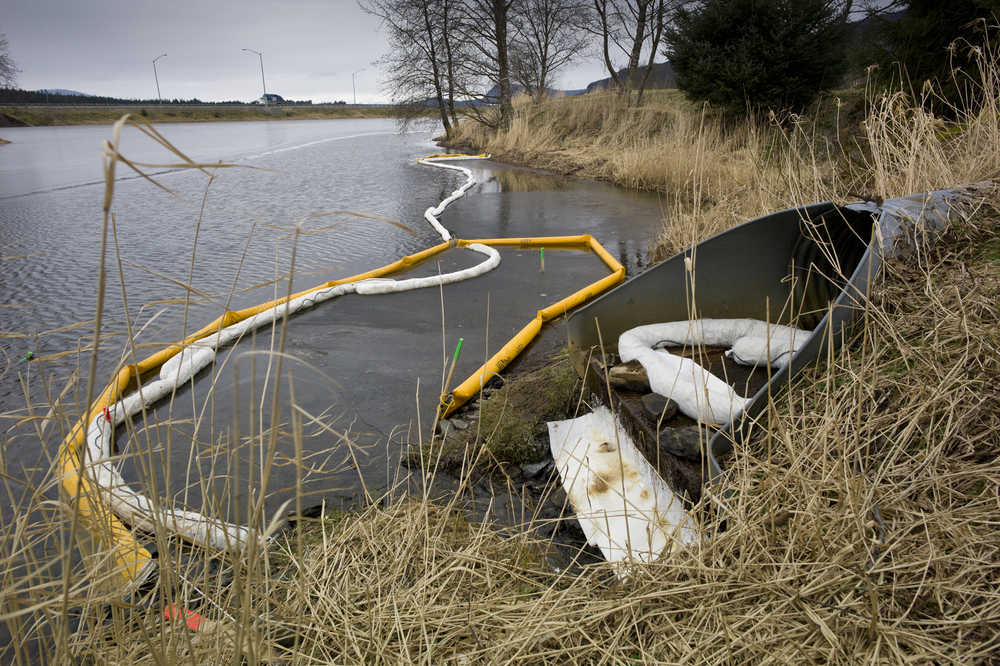By this time next week, the yellow and white booms that have surrounded a storm drain in Twin Lakes since the beginning of the month will be gone.
After visiting the oil spill site earlier this week, Bob Mattson of the Alaska Department of Environmental Conservation said the sheen that once coated the water confined by the booms was all but gone. There was still a little oil on the absorbent cleaning pads at the mouth of the storm drain, but not enough to cause concern.
“It’s kind of like your typical bell curve,” Mattson said, of the life span of an oil spill. He serves as regional manager of the DEC’s Division of Spill Prevention and Response. “You’ll get a lot of oil early on, and then it just kind of tapers off and tapers off and tapers off.”
Right now, the Feb. 3 spill that deposited 50 gallons of diesel fuel into Twin Lakes from a residential heating-oil tank in the Mountainside Estates neighborhood is approaching the tapering end of that curve. Mattson estimates that Nortech, the environmental and engineering consulting firm working with DEC to clean the spill, will remove the booms and cleaning pads in a week if not before. Until then, he hopes they serve as a reminder for homeowners to check their heating oil tanks regularly and replace them when need be.
“We tell people who need a new tank that if you’ve got $1,500 to replace it, that’s way better than $15,000,” he said, explaining the average cost of the cleanup bill that homeowners are required to pay. “You’re rolling the dice, and in my viewpoint it’s not worth it.”
Nortech declined to comment when reached Thursday.
Mattson said that the DEC receives reports of leaking oil tanks about three or four times per month. The cost of cleaning such spills depends on a number of factors, but they usually start around $10,000, Mattson said.
Cleaning a spill is not an easy process, especially if the leaking tank is buried, which was the case with the latest Twin Lakes spill. First, responders have to drain the tank and dig it out of the ground. They then have to remove all of the contaminated soil around the tank, which often requires an excavator. The oil-soaked soil then has to be tested, treated and disposed of at a special soil treatment facility. Here in town, it goes to Bicknell Inc.’s facility.
“My heart kind of breaks every time we have to deal with a home-unit oil-tank spill because it can be very costly,” said Allison Natcher, an environmental program specialist with the DEC.
Mattson said that the homeowners whose leaky tank spilled into Twin Lakes were relatively fortunate. Sometimes, bellow-ground fuel tanks can leak for months before anybody detects a problem. This makes the spill much more difficult to clean and more costly for the impacted homeowner.
People were able to detect this spill early because the leaking fuel got into a nearby drainage system.
“It didn’t take long for it to reach the French drain system, and that shot it out into the daylight,” he said. “That was the saving grace for this one.”
And it was likely the difference between the spill being 50 gallons and the entirety of the tank, which was larger. A 50-gallon spill, Mattson said, is much more manageable.
“If you have a 50-gallon spill, we’re always relieved,” he said. “But even 50 gallons can create a great deal of havoc if it’s in the wrong place.”
Unfortunately, Twin Lakes is definitely “the wrong place.” Worse, Mattson said that spills in Twin Lakes are not uncommon.
“Unfortunately this part spill kind of fits the pattern,” he said. “Anybody who walks their dog along Twin Lakes frequently will know that this happens once or twice a year; it’s not too unusual.”
And it’s preventable. Mattson recommended that homeowners check their oil tanks every fall and spring, and he recommended homeowners with underground tanks consider switching to above ground tanks which are easier to monitor for leaks.
“Time really is money,” he said. “The sooner you can tell you’ve got a leak and try to stop it, the better.”

